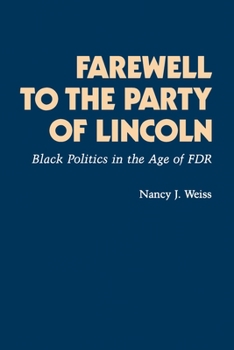Farewell to the Party of Lincoln: Black Politics in the Age of F.D.R
Select Format
Select Condition 
Book Overview
This book examines a remarkable political phenomenon--the dramatic shift of black voters from the Republican to the Democratic party in the 1930s, a shift all the more striking in light of the Democrats' indifference to racial concerns. Nancy J. Weiss shows that blacks became Democrats in response to the economic benefits of the New Deal and that they voted for Franklin Roosevelt in spite of the New Deal's lack of a substantive record on race...
Format:Paperback
Language:English
ISBN:0691101515
ISBN13:9780691101514
Release Date:November 1983
Publisher:Princeton University Press
Length:360 Pages
Weight:1.05 lbs.
Dimensions:0.9" x 6.1" x 9.3"
Customer Reviews
3 ratings
Should have continued past the New Deal
Published by Thriftbooks.com User , 16 years ago
I enjoyed Professor Weiss' discussion of how Black voters began to shift their allegiances from the Republican Party to the Democratic Party during the New Deal. What I found particularly interesting was that in 1932, even as just about every other group was running away from Herbert Hoover, Black voters continued to be loyal to him. I suppose that Black suspicion of Democrats at that time was quite deep, so much as to stay with a (rightly or wrongly) widely discredited incumbent. Professor Weiss then discusses how FDR had to tread very lightly on the issue of civil rights, so as not to alienate Southern Democrats, who controlled key Congressional committees, and who were a major Democratic constituency (in this way, FDR was the real architect of the "Southern Strategy," even though liberals seem to want everyone to forget this). Nevertheless, Blacks became more supportive of FDR as his Presidency continued. While I think Professor Weiss does a good job with the time period that she discusses, she should really have looked at Black voting patterns after the New Deal, going all the way into the mid 1960s. For example, many (though not most) Blacks were voting Republican during the Eisenhower Administration. Moreover, a number of prominent Black leaders initially endorsed Richard Nixon's 1960 Presidential candidacy (though some of them later switched their support to John F. Kennedy). In many ways, it was Lyndon Johnson's signing of the 1964 Civil Rights Act (whose passage would have been impossible without the support of most Congressional Republicans), coupled with the Presidential candidacy of Sen. Barry Goldwater (a principled opponent of the Civil Rights Act, but no racist) that pushed the vast majority (close to 90%) of Black voters into the Democratic Party.
Provides a clear depiction of Afican American governance
Published by Thriftbooks.com User , 25 years ago
After reading this historical account of the Afican American experience during the 1930's I was taken with its excellent accuracy in these events. We are taught to respect the doctrines brought forth by our political leaders, but this was hardly the case under FDR's New Deal. This book depicts the New Deal as a fully political venture, rather than an honest attempt to help the destitute of our country. Never before has history been shown to me in this way, I respected the author and their findings. Also the book is clear, easy to read and altogether enjoyable. I would recommend it highly!
A fast, informative read
Published by Thriftbooks.com User , 26 years ago
Why did black Americans switch from the Republican to the Democratic party in the 1930s? In this book, Weiss argues that it was primarily due to economic, rather than racial incentives. While Weiss' arguement isn't very complex (nor does it need to be), her book provides readable insight into the black experience with FDR's New Deal.





